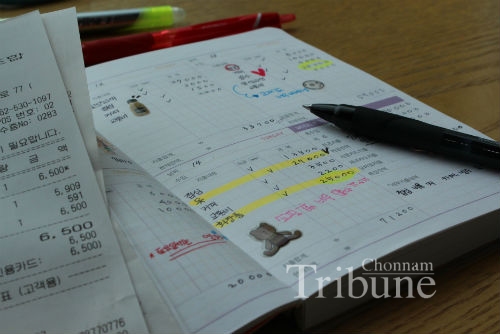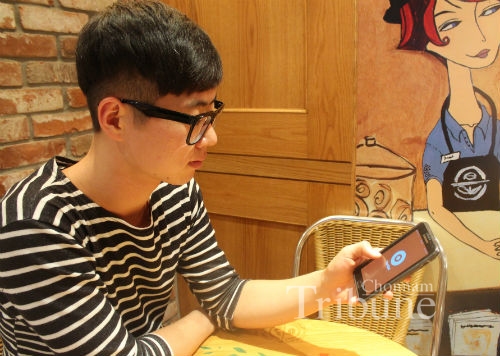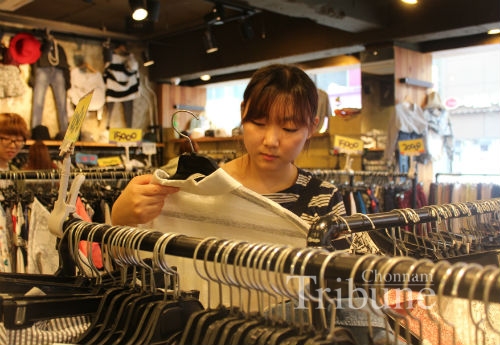2014 CNU Student Consumption Survey Report

Where did all my money go? It would be your first reaction whenever you check your account balance. The money was sure there but it is not there now and you have no idea where you spent it. Students want to do many things but they do not have enough money to do all the things they would like. Even if they work for money, part time jobs just give them small pocket money. Therefore, they are looking for smart alternatives to satisfy their desires and save money at the same time. What is you spending pattern? Are you spending your money smartly?
How Much Do You Spend in a Month?
The Chonnam Tribune conducted a survey of 216 students at Chonnam National University (CNU) to find out students’ consumption patterns last August. When we ask them ”What do you spend your money on?”, 30.8 percent answered that they spend their money on food, followed by transit at 26.3 percent, cultural life at 19 percent, and entertainment at 13.2 percent. The first and second categories, food and transit make sense since many students take the bus to come to school and spend money to eat when they are at school. Cha Dae-heon (Junior, Dept. of Bioenergy Science and Technology) said that ‘food’ is the biggest burden for him and also he spends a lot of money on eating and drinking beverages to spend his dead hour between lectures. “During a semester, I spend my money to have a meal one or two times in one day, and a meal costs about 4,000 won or more."
According to the result of the 2014 Survey on the Living Conditions of CNU students released by the Counselling Center, more than half of students get 200,000 won or more as an incidental allowance. It seems enough for students to use each month, but it is not true. 12.3 percent of the surveyed students said that they were unsatisfied with their university life because of 'economic difficulties' which took fourth place for the reason.

Choi Jin-ho (Senior, Dept. of Mechanical Engineering) said, “I always need more money than I have as I become a senior. The number of meetings I need to attend is increasing and I also need to treat my juniors as well. I know I have to use my money sparingly, but sometimes I need to pay money to help build solid personal relationships.” Another student, Lee Hyeon (Freshman, Dept. of Plant Science) said that "I want to watch movies, drink alcohol with my friends, study TOEIC, and other things without worrying about money. However, it is too expensive for me to do all that. I once had a part time job but I was not able to keep it long because having good grades is a primary thing as a student. Unfortunately, it was not easy to work and study at the same time."
Many students want to do many things during their university period but because their pocket money is limited, they have to choose between those things they desire to do. When you see a student's purse, you will see many discount coupons and mileage cards but little cash. It shows how students survive with their limited capital by using smart ways to cut down their expenses.
How/Where Do You Buy Items?


The result of our survey of students’ buying habit showed a lot of students have a tendency to shop at a store. 65.7 percent of respondents answered they go to stores and directly buy items. 31.9 percent said they use Korean shopping websites, and a relatively small number of students answered they buy products via overseas shopping websites or online group buying. Here are four different types of consumption behavior.
For the first type, more than half of the students said that they visit stores in person to make a purchase. One of the respondents, Son Seo-hee (Sophomore, Dept. of German Language and Literature) said that ”I prefer going to stores when I buy my clothes. I can see the color and the design, and I do not need to come back later to change the size.” ”It might be more expensive than online shopping websites but I get what I exactly want and spend less money,” she added.
Using domestic online shopping malls was the second highest choice. Choi Su-bin (Freshman, School of Business Administration), who said she mostly shops online, said, "The reason I go online to buy what I need is that it is a lot more convenient than going to stores. I can buy whatever I want by clicking a few times and it is delivered to my home. Also, online shopping makes it easier to check whether the products are on sale or not and it has a better mileage system. Offline stores do have sales periodically but I still do not want to go shops since they are too crowded with people." Convenience is the best part of shopping online.
The third type is overseas direct purchase that means they purchase on an overseas website to buy cheaper or greater goods from outside the country. Some students explained that the greatest merit of buying via overseas shopping websites is that some products are much cheaper than domestic markets. Fourth, only a small percentage of students said they use group purchase that means they purchase something with other people because when they buy something together, they can get things at a low figure. It might not be the best way that you would use always, but once you find the right group purchase, you can get it with a much cheaper price. Although there are few students who use these two methods, it seems that it is also one of the most cost-effective methods which students can use to save their money.
How about Moving beyond Consumption: Good Consumption
We asked students if they need to change their consumption habits and 62 percent of them answered they feel they need to improve their ways to manage their money. ‘I spend my money without creating a spending plan’ and ‘I lash out on shopping or eating out’ were the most common reasons. Although many students want to change their spending habit, they do not know how to do. Hong Eun-sil (Professor, Dept. of Family Environment and Welfare) said, “Students should get an economic education that can provide practical information about their spending.” If students get ideas on good and bad money management, they will be better living with their limited pocket money.
Professor Hong added that smart consumption is more than just saving money. "It is time to take a step further beyond just cost-effective consumption and saving money. We need to think of the effect we could bring every time we spend money on something." Buying fair trade coffee could help workers to get paid what they deserve it. Going on second hand shopping could be the way to stop wasting resources. There are many examples of ethical consumption if you pay little bit more attention to it. "Students might think their consumption does not affect anything since they spend so little compared to people who have a job, but such consumption which benefits everybody does change the world. It might not easy to do it right away but ethical consumption should be practiced from now on," said Professor Hong.
By Lim Seon-young, Student Editor

